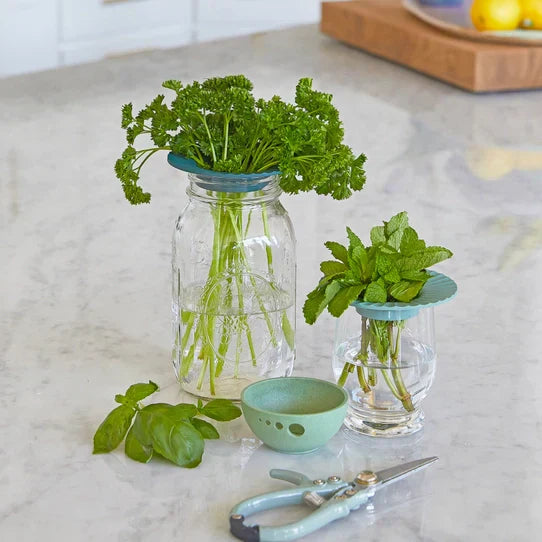
Extend the Life of Your Fresh Herbs with This Simple Water Storage Method
Share
Fresh herbs add vibrant flavor and aroma to any dish, but they can often wilt and lose their freshness long before we get the chance to use them all. Fortunately, there’s an easy and natural way to extend the shelf life of your favorite herbs: storing them in water! Not only does this method keep your herbs fresh for longer, but it also ensures you always have fresh herbs on hand, ready to enhance your meals.
Why Does Storing Herbs in Water Work?
When herbs are cut, they stop receiving nutrients from the plant, which leads to wilting and decay. However, by placing the stems in water—just like flowers—you're providing the herbs with hydration. This allows them to stay fresh longer by continuing to absorb moisture, preventing wilting and extending their shelf life. Additionally, the water helps preserve the herb’s flavor and aroma, so your herbs stay potent and fragrant for a longer period.
Which Herbs Benefit from the Water Method?
Not all herbs are suited for storing in water, but many of the most common kitchen herbs thrive in this setup. Here are a few herbs that do particularly well when stored in water:
-
Basil: Basil is one of the best herbs for this method. Its leaves are delicate, and keeping the stems in water prevents wilting and browning.
-
Mint: Mint stays fresh and vibrant when hydrated properly.
-
Rosemary: While not as sensitive as basil, rosemary lasts longer in water than it would in the fridge.
-
Thyme: Thyme benefits from water storage, maintaining its flavor and fragrance.
-
Oregano: Oregano holds up well in water storage, making it another herb to try.
How to Store Herbs in Water
Storing herbs in water is incredibly simple, and you can make the process even easier and more effective by using a produce keeper. Here’s a step-by-step guide:
-
Trim the Stems: Cut about 1 inch off the stems of your herbs at a slight angle. This creates a fresh surface for the plant to absorb water.
-
Place Herbs in Water: Fill a jar or glass with water (about an inch or so) and place the stems of the herbs in the jar, making sure the stems are submerged but the leaves stay dry. For an even more efficient storage method, use a produce keeper. These containers are designed to keep the stems hydrated while keeping the leaves elevated and dry, which helps to prevent decay.
-
Use the Produce Keeper: Place your herbs in the produce keeper, fill the base with water, and let the stems absorb moisture. The design of the keeper ensures the leaves are kept dry and the stems are properly hydrated, extending the life of your herbs.
-
Cover (Optional): For herbs like basil and mint, you can cover them loosely with a plastic bag or the produce keeper’s lid to create a greenhouse effect. This helps maintain moisture and keeps the leaves fresh.
-
Change the Water: Every few days, replace the water with fresh water to keep it clean and ensure that your herbs continue to thrive.
-
Store in the Right Spot: Store the jar or produce keeper with herbs on the counter (not in the fridge) for herbs like basil, mint, and rosemary. For hardier herbs like rosemary or thyme, you can place them in the fridge if you prefer a cooler environment.
Benefits of Storing Herbs in Water
-
Extended Shelf Life: Herbs stored in water typically last up to two weeks, depending on the type, compared to just a few days if left on the counter.
-
Preserved Freshness: The hydration keeps the leaves fresh, vibrant, and full of flavor, ensuring they're always ready to use in your cooking.
-
Sustainability: If you have an abundance of herbs, storing them in water helps you use them up before they spoil, reducing food waste.
-
Easy Access: Keeping herbs in a visible jar on your counter makes them easy to grab for cooking, so you’re more likely to use them before they go bad.
Conclusion
Storing herbs in water is a simple, natural way to extend their shelf life and keep them fresh and flavorful for longer. By keeping your herbs properly hydrated, you not only reduce waste but also ensure you always have fresh ingredients ready to elevate your cooking. If you want to make the process even more efficient, consider investing in a produce keeper. These handy containers are designed to keep your herbs hydrated while preventing the leaves from sitting in water, so your herbs stay fresh and vibrant for longer.
Ready to keep your herbs fresh and your meals flavorful? Try a produce keeper today and enjoy longer-lasting herbs with less effort!